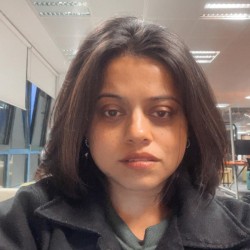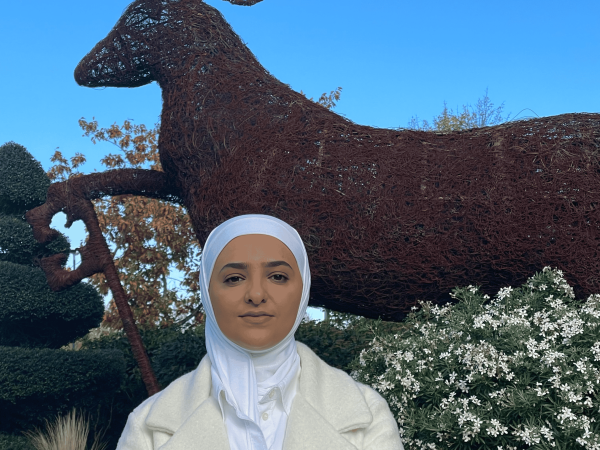
Shraiya P.
"Surrey has allowed me to grow both academically and personally. I’ve been able to connect with inspiring lecturers, gain hands-on experience, and build a network of like-minded peers."
Course
Sustainable Development MScWhy did you choose to study your course at Surrey?
I chose to study the MSc Sustainable Development at the University of Surrey because it offered exactly what I was looking for, a course that combines academic depth with practical, real-world relevance.
"From the very start, the admissions team was incredibly prompt and helpful in answering my questions, which made it so much easier to feel confident that Surrey was the right choice for me."
Surrey has allowed me to grow both academically and personally. I’ve been able to connect with inspiring lecturers, gain hands-on experience, and build a network of like-minded peers. The course has given me the confidence and skills to contribute meaningfully to sustainability work that can make a real difference. Receiving the International Excellence Postgraduate Scholarship of £5,000 also made my transition smooth, allowing me to settle in quickly and focus fully on my studies.
"One of the aspects I’ve enjoyed most is the diversity in the classroom; students range from their early 20s to mid-40s, bringing a wealth of perspectives and experiences that make discussions really engaging."
Visiting faculty from prestigious institutions and leading multinational organizations have added incredible value, sharing real-world insights and sparking debates on current sustainability challenges. The Centre for Environment and Sustainability (CES) has an excellent reputation, and being an ISEP student member provides a strong platform to kickstart your career after graduation. The CES faculty are highly approachable, supportive and excellent mentors, while the classes are well-structured, with agendas shared in advance to help students prepare and engage fully.
All the supportive staff, diverse peers, expert mentorship, and exposure to real-world sustainability issues have made Surrey the perfect place for me to deepen my understanding, apply what I learn, and build a professional network that will help shape my future career.
What are the best things about Surrey and your course?
One of the best things about studying at Surrey is the incredible range of opportunities it offers to explore and engage beyond the classroom. The MSc Sustainable Development course provides a solid academic foundation, but what really made the experience enriching is the freedom to pursue interests in diverse ways. I have access to world-class journals and a huge online repository of research papers, books, theses, and dissertations, which makes research and learning both convenient and comprehensive. My favourite subject were on Environment risk assessment, Life cycle assessment, Carbon emission tracking.
Surrey encourages students to engage with real-world issues and apply their learning practically. Attending a variety of seminars and guest lectures allowed me to hear from experts across academia, industry, and policy, while also participating in discussions on pressing sustainability challenges. I am also a sustainability fellow at Institute of Sustainability and get to attend diverse seminars and network with people and build connections.
What are the best things about life here as a postgraduate student?
One of the best things about life at Surrey as a postgraduate student is the vibrant and supportive environment that allows you to grow academically, professionally, and personally.
"During my time here, I had the opportunity to intern at Spelthorne Borough Council, where I worked on developing a flood mitigation strategy and calculating Scope 1 and Scope 2 GHG emissions using DEFRA conversion factors. This hands-on experience gave me insight into local sustainability challenges and the practical aspects of environmental management."
For my dissertation, I undertook an industry-sponsored project focused on bridging research gaps in space-based air quality monitoring across the Middle East and Africa. This allowed me to combine technical research with policy considerations, providing a broader perspective on global sustainability issues. Together, these experiences offered invaluable real-world exposure, teaching me how to navigate complex problems, engage with stakeholders, and troubleshoot sustainability challenges at both the grassroots and strategic levels. They also strengthened my analytical, research, and communication skills, preparing me to contribute effectively in professional sustainability and policy roles.
What are your career plans?
My plan is to focus on my core interests in research and academia. Having recently completed the demanding process of my dissertation, I am now dedicating time to further developing my skills in policy research and academic writing. Alongside this, I am exploring career paths in ESG consulting, as I am keen to apply my knowledge to practical, real-world sustainability challenges.
"I am particularly interested in working with think tanks and research institutions to engage with core sustainability policy issues in the UK and EU. I want to contribute to evidence-based policymaking that drives tangible environmental and social impact."
This phase of my career is about combining rigorous academic research with practical applications, whether through publications, collaborative projects, or advisory roles. Ultimately, my goal is to bridge the gap between research and policy, shaping sustainable development initiatives that make a meaningful difference in society.
What advice do you have for students thinking of doing this course?
My advice for students thinking about the MSc Sustainable Development at Surrey is to make the most of everything the course has to offer, both academically and practically.
"Get involved in seminars, workshops, and group projects, and don’t hesitate to reach out to the supportive CES faculty for guidance. Take advantage of the diverse student community to learn from different perspectives and build lasting connections."
Build your MS excel, PowerPoint and statistical skills. Also, explore extracurricular opportunities, like writing policy articles or leading initiatives through the Sustainability Society, these experiences really enrich learning. Above all, stay curious, proactive, and ready to apply your knowledge to real-world sustainability challenges.

